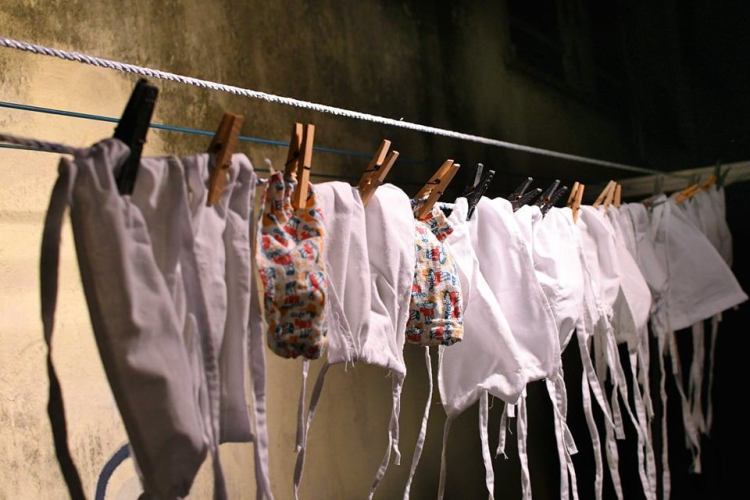Virgilio Piñera would have been surprised to know that that verse of his “the damn circumstance of water everywhere” was going to be the most cited and hackneyed of all his tremendous literary work—even among those who don’t know it. Assuming that, in addition to literary merit, that verse contained a key about Cuba, its people and the complex logic of its history, it would be worth putting it to the test at this time.
Many continental countries surrounded by permeable borders would today envy that natural barrier that the sea represents in Caribbean islands. In the case of Cuba, if its 3,735 km coastline were a land border with other countries, it would be longer than that of Mexico with the United States, that of Colombia or Brazil with Venezuela, and almost four times greater than that of Guatemala with Mexico.
Can you imagine controlling that border with territories where the panic pandemic would have make tens of thousands of unprotected people seek refuge in a neighboring country, whose health services would have a reputation for facing epidemics of rare diseases in Africa and other regions? If anyone could walk across that border at one of its most intricate points? If entire families without any protection, were, for example, standing at our door, begging for their lives?
It’s not about thinking of national salvation as opposed to the misfortune that is ravaging the world, of course. It would be foolish to think of ourselves as a separate mass, especially on an open, pending and exterior-dependent island for 500 years; and that it continues sending doctors to almost 60 countries. I limit myself to pointing out that, if in the strategic context of a global security crisis it is essential to take a distance, an obvious comparative advantage consists precisely in having no land borders with anyone.
I will try to give a reading here on the epidemic, as a human security problem for civil society and politics, compared to other threats (such as natural disasters), and in particular, based on mobilization and communication.
As is known, the human security approach emphasizes that “hurricanes, earthquakes, epidemics, droughts, floods, as well as hunger and environmental pollution, cut short more lives than wars, repressions” and other conflicts in the world (Temas # 64, Oct-Dec, 2010). Unlike national security, which privileges the preservation of the State, sovereignty, military force, armed conflict and internal order, human security places at the center threats to life and its basic conditions of reproduction.
If we compare the experiences of two human security challenges, such as the tornado that devastated areas of Havana on January 27, 2019, and the current global epidemic, some interesting, useful aspects could be considered, within their great differences in scale, to think about the society and politics of this new era.
The tornado, confined to a well-defined area of urban space, provoked an instantaneous response from civil society, beyond that territory, and even the country. Generated from very different points, these actions converged to support the survival of the group of affected persons, to alleviate their helplessness, provide immediate means of sustenance and protection, contribute to recovery. After a first moment of readjustment in the operating rules of the civil defense system, and its flexibility under the pressure of the emergency, access to the area to provide relief and also to participate directly in aid remained open, so that the articulation between the initiative of the mobilized and the institutional resources could flow fully.
In the tornado experience, the availability of the Internet, mobile data, WhatsApp, networks, facilitated mobilization and self-management. In fact, the scale and degree of autonomy, organization, and fundraising of those mobilized in the tornado surpassed regular volunteering in disaster situations; not only in quantity and technologies, but in its quality. The mobilization was characterized by not waiting for guidance, deploying effectively and promptly, and seeking coordination with local institutions from the beginning. They had an opportunity to learn to channel the initiative from below, and to proceed with the autonomy of a real local power, which, in crisis situations, should not limit itself to following instructions from above.
Likewise, it offered the central power the opportunity to react quickly, to remove the bureaucratic obstacles, and to make the established machinery work at full speed, and absorb the contribution from below. This contribution was not only in kind, but also generated its own mobilization, autonomously, to become a channel for direct participation, which exceeded the significance of donations from near and far.
In a society accustomed to the great mobilization oriented from above, those who contributed, received, divided and worked in the recovery at the base, had a particular civic experience, which also allowed them to experience deep society, and to understand it better, as well as experience the battle for welfare and social justice distributed to all as a concrete practice, and not just at a discursive or symbolic level.
The fact that a fairer society is not just growth, but human security; that the necessary control measures should not undermine the capacity of that society to heal itself; that without decentralization, autonomy, and trust in people, unity is an empty whole; and that no compendium of norms, nor law, could replace the concrete practices of a civil policy from below, was precisely at the center of that tornado experience.
In contrast to the tornado, the initiative and the fight to control the epidemic have been on the side of the institutions of the State and the government. This not only responds to the anticipation and planning capacity of epidemiological contingency plans, the technical and professional content of public health, the specialized nature of the detection and treatment of the disease, but the complexity of a threat. It affects the functioning of the whole life of society, including the economy, and substantially modifies that of state and social institutions, from schools to churches, and basic services, from transportation to public order.
In contrast to the tornado and its effects, and unlike foreseeable disasters, such as hurricanes, it is not a threat located in a given space, but rather deployed in a rather invisible way, and whose progress is difficult to calculate a priori. Consequently, it tends to be underestimated by the majority, until the evidence of its scope and danger is revealed. Thus, the main line of defense, that of prevention, lies in winning people’s minds, even before the ravages of the disease are shown in all their magnitude.
The confrontation of the epidemic, therefore, implies a main communication resource, without which the social response is disaggregated. In a citizen culture accustomed to mobilization, it may be easier to channel or facilitate it than to immobilize people in their homes. Accustomed to living out of doors, Cubans have a particularly hard time staying indoors.
In contrast to the tornado, or hurricanes, in the case of the epidemic, the greatest damage can be avoided. In natural disasters, the size of the danger does not have to be demonstrated, since everyone shares the experience of its destructive power, so that anticipating its intensity or verifying the extent of the damage caused is convincing. The effects of the epidemic, however, remain to be seen, and are virtual, until the number of victims is revealed.
In the field of information, the initiative is also on the side of state and government institutions. Naturally, without transparency, there is no credibility; and without convincing, there is no way to influence citizen behavior and induce them to submit to an emergency order. In a country where smartphones have long ceased to be an exception, and where information monopoly is technically unlikely, control of information becomes a subtler issue. However, offering it has side effects. When it is reported that almost all registered infections are associated with contacts with foreigners or travelers, the certainty that borders must be closed, even before the epidemiological contingency plan foresees it, becomes part of common sense and an unavoidable consensus.
Regarding information, and its use, the pandemic is not, by definition, a local event. So the way to deal with it everywhere is available online every day. This global synchronization is accompanied by the so-called Dunning-Kruger effect, characterized by the abundance of “people with little knowledge of a subject who perceive themselves to be experts after superficial information,” that is, self-employed epidemiologists who swarm the networks and electronic publications, including our country.
So, right away, the effectiveness of the use of the facemask, the applicability of the “South Korean model,” the ingestion of hot, or acidic, or basic, or alcoholic beverages; the need to advance stages; rapid or molecular tests, a whole avalanche of opinions, often contradictory, fill the public sphere.
In the case of the tornado, the self-mobilized pioneers had to persuade local authorities; in the pandemic, the authorities have to persuade citizens, and use all resources to create citizen responsibility.
That means not only offering up-to-date and truthful information, but eventually applying more stringent regulations while advancing, including imposing strict zonal isolations. Because despite the control habits established in a country like Cuba, not everyone responds in a disciplined way to the demands of an emergency situation like this. (As I finish this article, I just found out that, as of Friday, April 3 at 8:00 p.m., the People’s Council where I live, in Plaza municipality, has been declared in total quarantine.)
As for the dynamics of social networks, and pending an investigation to support it, it would seem that, as happened in the tornado situation, the ideological struggle and politicking have been giving way in the siege of the issue. The information provided by institutions and public media ostensibly prevails over anti-government media. According to recent statistics from the Ministry of Communications, visits to places like Cubadebate have tripled. Surely it would not be an exaggeration to estimate that Cuban television news programs are more followed than ever.
Finally, the epidemic comprises an unprecedented context of political communication between institutions/leaders and community/citizens. What impact will it have on reinforcing the legitimacy and credibility of a president and a government with just two years in office? Although it is too early to answer this question, it would be difficult to imagine a more complex circumstance, and that would place more stress on his ability to deal with a crisis situation in peacetime, than this pandemic.
Although the appearance of ministers on television and in meetings throughout the country has characterized the new style of government since it took office in April 2018, this event has exposed them more as persons, ways of reasoning, speeches, defects and qualities than of any other cabinet of which the vast majority of Cubans can remember. Although a government team is not a empathy contest, as a whole and each separately, for the first time they are going through a singular public scrutiny: projecting themselves as political leaders, instead of officials who only speak to their subordinates or their bosses.
Beyond revealing this human condition, including that of an unexpected Prime Minister, there are responses to long-standing demands in the Cuban government’s strategy in the face of the pandemic crisis. Although only until now these are measures that the national emergency has made viable, these range from greater flexibility in the face of taxes on the private sector, telephone rates, facilities for tortuous administrative procedures, to the access of churches to television to celebrate Easter, in addition to recognizing as valid many critical approaches and proposals of the population, instead of dismissing them as “playing with the enemy.”
At the end of the day, after having learned from the Prime Minister, in one of these appearances, that almost half a million Cubans have permanent residence abroad and on the island, I hope no one will again mention to me the evilness of living in a land surrounded by water everywhere.










